Russian President Vladimir Putin has kept the experts baffled as to what his next move will be, accepting the resignation of his prime minister on Wednesday and immediately nominating the unknown Viktor A Zubkov to fill the post.
Mr. Zubkov has wowed Mr. Putin and few others as the head of a financial crimes agency.
The outgoing prime minister, Mikhail Fradkov, resigned on national television, reading from a script extolling Mr. Putin’s ability to build "a power structure in light of the upcoming political events."
Some political analysts believe that Mr. Putin installed Mr. Zubkov because he has demonstrated his loyalty and will follow orders in the upcoming presidential election. Mr. Putin has repeatedly indicated that he will honor Russia’s constitution and step down when his second term expires next year.
The Russian constitution, however, does not forbid Mr. Putin from seeking a third, non-consecutive term. Some have speculated that Mr. Putin will name a puppet as his successor who will develop a mysterious illness and promptly resign, enabling Mr. Putin to resume his presidency via a special election. In a different scenario, pro-Kremlin lawmakers in the Russian Duma could amend the constitution to permit Mr. Putin to remain in office.
One thing is clear: Mr. Putin has the power to choose the next president of Russia. While elections are held by popular vote, the ballots are meticulously managed by the Kremlin. Russian elections are won by candidates who enjoy the support of the government and the state-controlled news media.
Mr. Putin’s approval ratings hover above 70%. Of course, there is no independent polling in Russia. The polls which cast Mr. Putin in such a favorable light are directly commissioned by the Kremlin.
Analysts were surprised Wednesday that Mr. Putin did not promote presidential contender and deputy prime minister Sergei B. Iavonov to prime minister. Mr. Iavonov had appeared to gain the upper hand over his main rival, deputy prime minister Dmitry A. Medvedev in recent months. By installing a low-profile prime minister, Mr. Putin has increased the suspense: who will be his successor? Will he even have a successor?
My rubles are still on Mr. Iavonov.
Interesting, unverified facts:
When the name "Putin" is written in Japanese, it is the Japanese word for "pudding." In French, "Putin" means "prostitute."
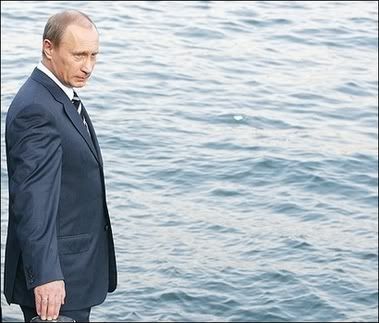
Fradkov sleeps with the fishes.
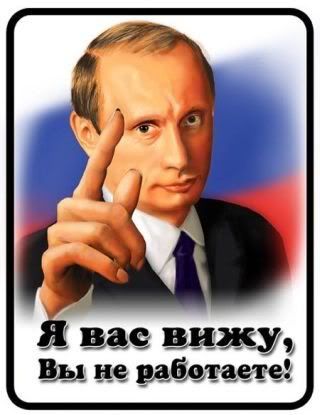
Translation: I see, you’re not working!
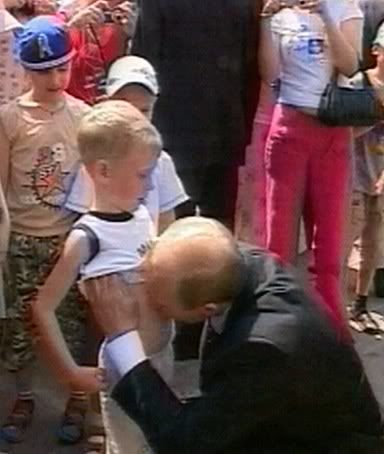
Putin names a surprise successor.

Russia is cold.
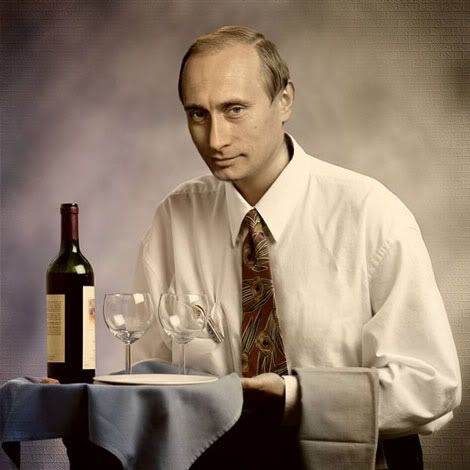
Putin is warm.
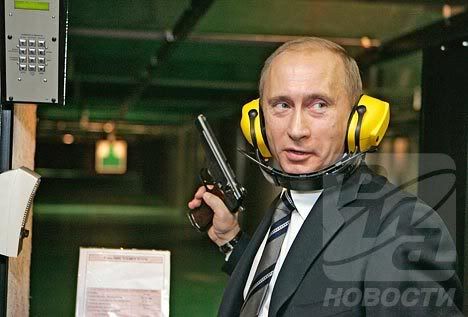
KGB-style.
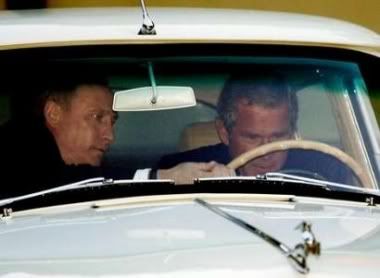
No, let me drive!
Mr. Zubkov has wowed Mr. Putin and few others as the head of a financial crimes agency.
The outgoing prime minister, Mikhail Fradkov, resigned on national television, reading from a script extolling Mr. Putin’s ability to build "a power structure in light of the upcoming political events."
Some political analysts believe that Mr. Putin installed Mr. Zubkov because he has demonstrated his loyalty and will follow orders in the upcoming presidential election. Mr. Putin has repeatedly indicated that he will honor Russia’s constitution and step down when his second term expires next year.
The Russian constitution, however, does not forbid Mr. Putin from seeking a third, non-consecutive term. Some have speculated that Mr. Putin will name a puppet as his successor who will develop a mysterious illness and promptly resign, enabling Mr. Putin to resume his presidency via a special election. In a different scenario, pro-Kremlin lawmakers in the Russian Duma could amend the constitution to permit Mr. Putin to remain in office.
One thing is clear: Mr. Putin has the power to choose the next president of Russia. While elections are held by popular vote, the ballots are meticulously managed by the Kremlin. Russian elections are won by candidates who enjoy the support of the government and the state-controlled news media.
Mr. Putin’s approval ratings hover above 70%. Of course, there is no independent polling in Russia. The polls which cast Mr. Putin in such a favorable light are directly commissioned by the Kremlin.
Analysts were surprised Wednesday that Mr. Putin did not promote presidential contender and deputy prime minister Sergei B. Iavonov to prime minister. Mr. Iavonov had appeared to gain the upper hand over his main rival, deputy prime minister Dmitry A. Medvedev in recent months. By installing a low-profile prime minister, Mr. Putin has increased the suspense: who will be his successor? Will he even have a successor?
My rubles are still on Mr. Iavonov.
Interesting, unverified facts:
When the name "Putin" is written in Japanese, it is the Japanese word for "pudding." In French, "Putin" means "prostitute."

Fradkov sleeps with the fishes.

Translation: I see, you’re not working!

Putin names a surprise successor.

Russia is cold.

Putin is warm.

KGB-style.

No, let me drive!


2 comments:
Beautiful title.
Also, the speculation that the new PM will contract a mysterious illness seems reasonable...
Seth:
Reasonable or inevitable?
Post a Comment